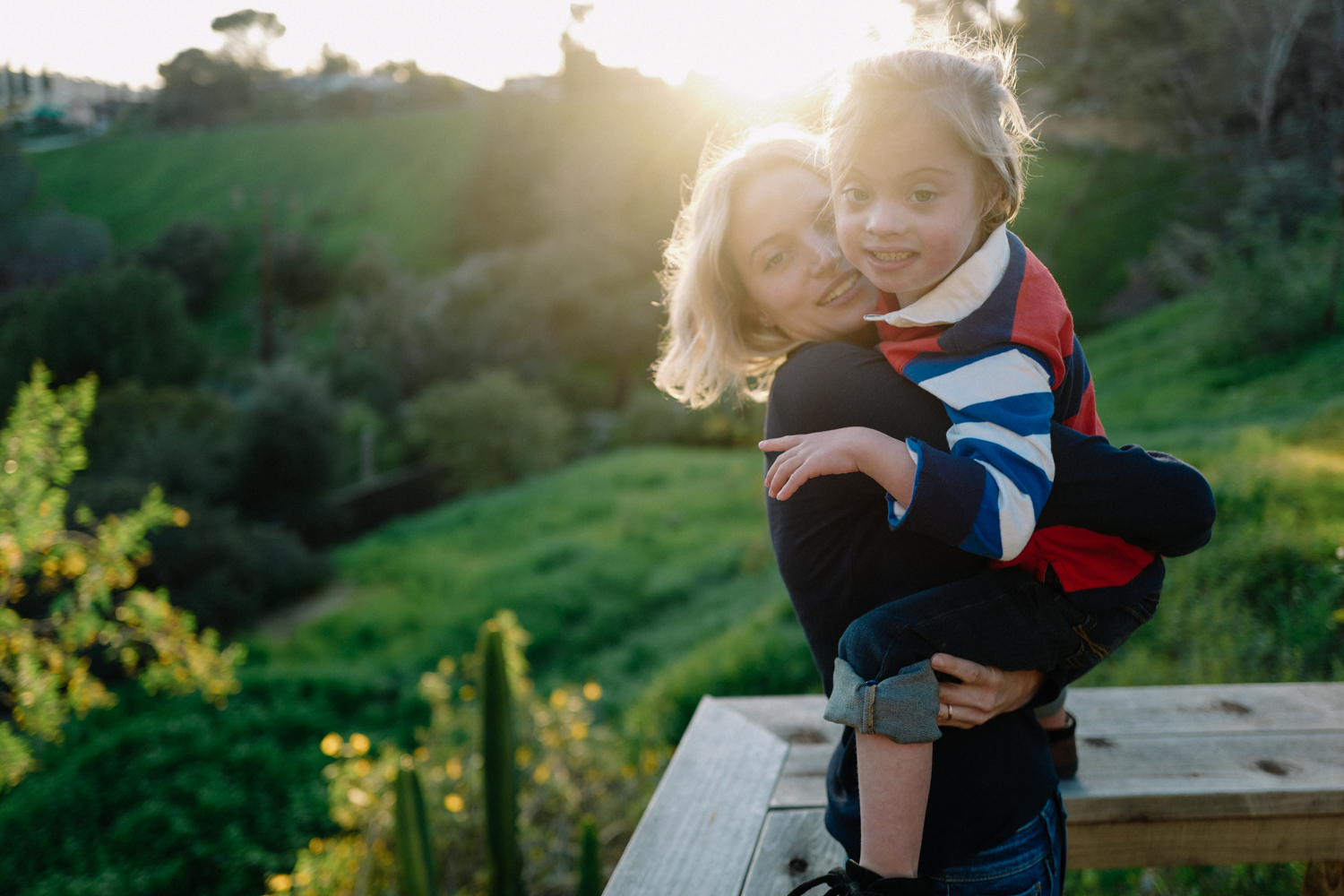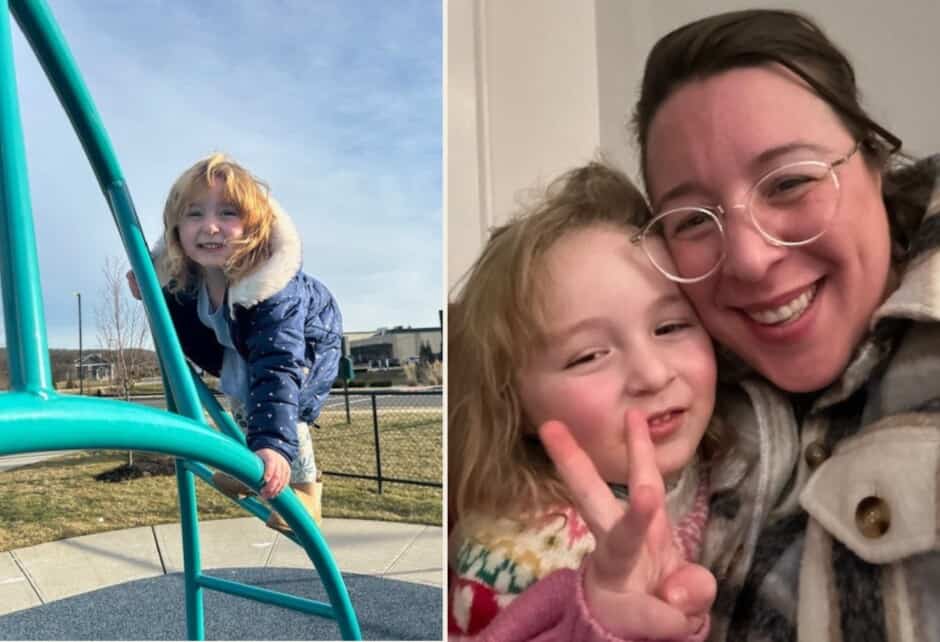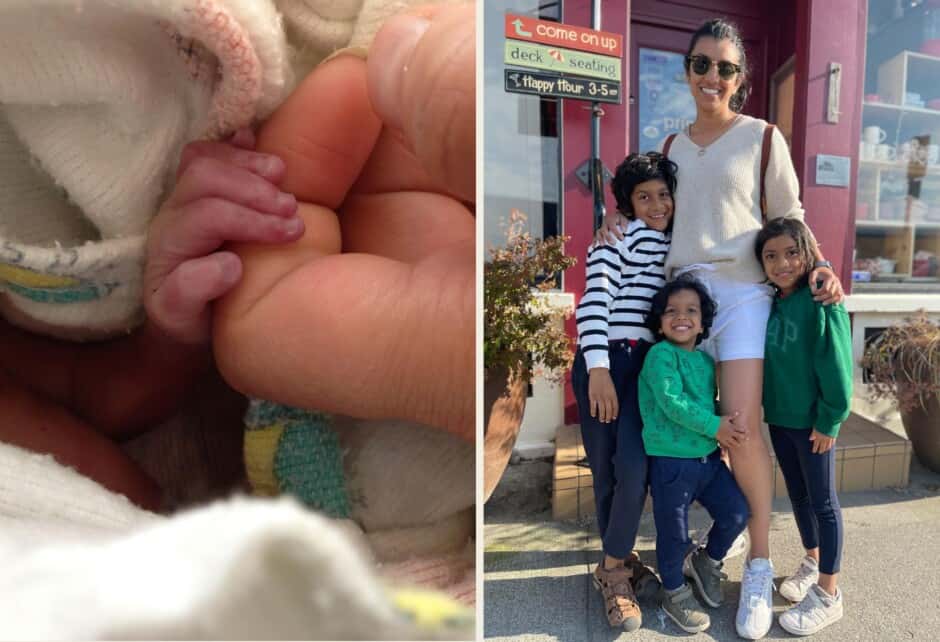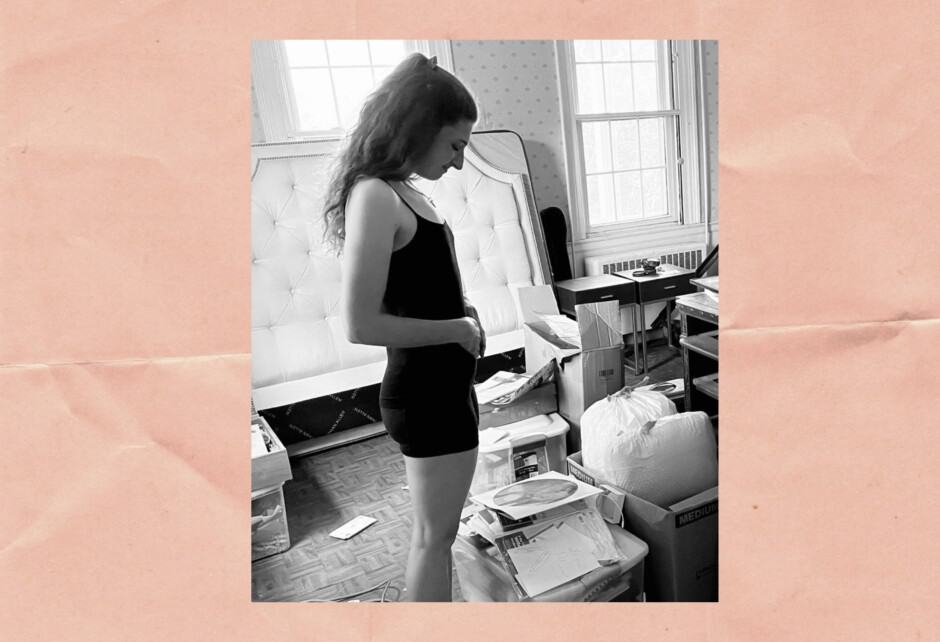
Mom Talk: A Dual Diagnosis
Written by
Amanda Booth
Photography by
Photograph by Mike Quinones
Like every mother before her, Amanda Booth‘s world changed the day she first held her child in her arms. And while every mother has experienced those moments when a hoped for, expected version of motherhood diverges drastically with reality, Amanda deals with this divergence almost daily. Amanda’s son Micah, 4, has Down Syndrome and Autism, and in today’s Mom Talk, she honestly shares what that experience has been like for her—from those first days of new-mom bliss mixed with uncertainty, to the recent discovery of his dual diagnosis. But more importantly, Amanda, a successful model and actress, and fierce DS advocate, opens up about feeling left out and left behind, and what the world can do to help. As Autism Awareness month comes to close, we think Amanda’s story (and her request for the rest of us) is more important to share than ever.
I know that the most natural human reaction to life is to be most aware of of the joys, challenges, and realities of your own. It can be so hard to wrap your mind around experiences that exist outside of your own orbit. This became all the more acute for me five years ago. I had never met someone with Down Syndrome before birthing my son. I didn’t know about Special Olympics, or buddy walks. I thought that people got pregnant, and had babies. I didn’t know about risky pregnancies, or the complications that could arise. I just had no idea. Now I do.
My husband and I wanted to start a family, so we got to trying right away. The very first time we tried, I became pregnant. I was 27. Two weeks after the stick showed us two lines, I felt an intense sharp pain in my side and immediately started gushing blood. We went to the doctor who did a blood draw to test my HCG levels as well as an ultrasound—I had miscarried. We waited a month to make sure I had a natural cycle, and then tried again. I immediately got pregnant again!
We started our checkups with our wonderful midwife Heather. The way I saw it, I’d give birth in a small pool in our living room, unmedicated. My two happiest places—home, and water. We took all the classes, watched the birthing videos, read the books on how to get through it. We were ready for our home birth.
We elected to not do any genetic testing. We wanted a home birth. We believed in the natural way of life, and that we shouldn’t try to control the type of baby we would get. There is no result that would have changed the outcome for us…we were pregnant with a baby, and we were having a baby. The first 36 weeks of pregnancy were pretty normal. But then, we had an ultrasound and things didn’t “look good.” The baby was measuring really small, and we were sent to see a few specialists. His long bones where shorter than normal. They said he could have Achondroplasia or be growth restricted. We monitored his heart rate over a few days, and as soon as he went into distress we were rushed to the hospital. I was medically induced. There went my swimming pool dreams…
I managed to maintain control over one aspect of the birth—I didn’t use any pain medication. That was the hardest thing I’ve ever done in my entire life. When I fully dilated and Micah was ready to enter the world, the doctor was at home, so I had to hold him in. HOLD HIM IN! Had I known what I know now, I would have demanded someone else catch the damn baby and got on with it. Of course, I did what I was told, and then Micah’s heart rate accelerated and he went into distress and I was told that I had one push to get him out or I’d be rolled away for an emergency cesarean. At this point, and all that had already not gone according to plan, you can imagine I pushed that fucker OUT! Thank God I have that to hold onto, because it was just downhill from there.
We had a few blissful hours after birth to cuddle, try to nurse, and get to know each other before we were abruptly greeted by the staff pediatrician. She came into our room and the first thing she asked was if we did any genetic testing. We knew at this point Micah was growth restricted, and that it was a result of my placenta being one giant blood clot. (We only found this out at delivery, of course.) With smiles on our faces, we said we did not. Everyone there knew we wanted a home birth, and were only at the hospital because of the emergency situation we had. We felt the judgements of doctors, nurses, and social workers, all of whom were questioning the choices we had made. A social worker came to our room and asked why we denied certain things, like the antibiotic ointment on his eyes at birth. I knew I didn’t have gonorrhea, which is what the erythromycin is for, so I felt it was unnecessary. Again…our desire was to birth our son as naturally as possible. That’s us. Our bliss and smiles were met in equal measure with judgement and harsh questioning “Why not? Your baby looks like he has Down Syndrome.”
I think I immediately went into shock and defense mode, because I just didn’t see it. I asked why she felt that way, and she pointed out two markers: he had almond shaped eyes, and his one ear was folded. I asked if his ear could have been from being growth restricted, and if the eyes could have been because his father had almond eyes, too? She said yes, that was possible. That was enough for us. We denied a blood draw. He was just under five pounds. We didn’t think it was a good idea to take blood from a tiny guy, and again—a diagnosis wouldn’t change anything for us. Good bye.
A few moments later, the social worker came back into our room. She asked why we didn’t want to test. She made it seem like they were threatening to take our baby away. Like we were unfit to parent. She listed off medical complications and snarkily said “Well, you know most babies with Down Syndrome have heart defects?” I confidently looked her in the eyes, said I knew he had a beautiful heart (we extensively looked at all the chambers during one of those specialist visits, but agreed to let them do the EKG, as it was completely noninvasive. His heart was beautiful. We took our pint-sized baby home, and we lived.
Three months later, our chosen (and wonderful) pediatrician suggested we do genetic testing now that he was big and healthy, to make sure in the event he had DS we would start the therapies we needed. Well it turns out…he has Down Syndrome. He was still our same little guy, and just like any parent, we made every effort to support him in his unique journey.
Four years later, we sensed Micah was different. Different from the different. He had major regressions, he wasn’t trying to talk anymore, he had more wheels turning than the usual kiddo with DS. We had a few therapists suspect a dual diagnosis of Autism. I think I went on defense and into denial again; I read all the lists of “if your child does this, he likely has Autism” and found reasons each time why they didn’t exactly fit or describe Micah. What’s tough is that Autism with Down Syndrome is different than typical Autism (and therefore the characteristics are different). There isn’t a lot of information on a dual diagnosis, and it was easy to say “that’s not us.” Well, it turns out…he has Autism.
I had no idea just how lonely life could feel. How isolating it was to be “different,” and then different again. That wasn’t my world, wasn’t my orbit. But now I do, and it is, and I feel an obligation to talk about it. I feel like with all the shit that social media brings into our daily lives, all the lies and false realities, something good can come from it, too. When I had my low days, and wept while nursing my sweet new baby, I would browse Instagram. When the internet was bleak, and had antiquated information on what our life would look like, it was social media that I found my peace. I saw families loving and thriving with their kiddos with DS. I made friendships with women who walked before me. I found resources and education on what comes next.
There’s no excuse to only being aware of your life now—if you are on social media it is virtually impossible. But if we are just utilizing this gateway into the lives of others by playing with filters and Facetune and trying to project a false version of ourselves to the world, we are wasting an immense opportunity. I’m not going to waste it. Will you join me?
If you’re still reading, I’ll take that as a yes. I’ll take it as a sign that you are interested in the orbits of others, and how you can help us feel less alone. So, here we go…this is my story, my reality.
Have you ever felt alone in a crowded room? Have you ever sat in a lecture hall, surrounded by hundreds of faces, and all those faces made you realize how all you are is just another face? Have you ever walked into a cafeteria, and all the tables were taken, and you just wished someone to look and see you were hoping for a spot, and wave you over? This is how I feel often in life, and especially at the park.
When we arrive, I see little ones running around and playing together. Moms sitting in circles, chatting with one another. When I walk Micah over to the play structure, I have to follow close behind. I’m unsure if he will reach his arm out when your kid comes near. He does this to say “please give me my space” or sometimes he gives a gentle hand grab to say hello. But to your kid, he’s pushing them, or being mean. I have to be there to just say “I’m sorry or this is how he says hello.” Sometimes we are greeted with “eeew” from kids, at the very least they stare and furrow their brow. I imagine they’re wondering why this kid their size is grunting, shaking beads, and not playing with them the way they know play to be—which is likely with words. I try to stick up for my son, while being gentle with yours, and as I’m sure you’re afraid to say the wrong thing, so am I.
I am not asking everyone on the planet to be responsible for my feelings. I don’t even want that. What I am asking, is for people to just care to hear this story. When I go to the park, I have to follow my toddler around because he is as strong as the other four year olds, but his curiosity is that of a one-and-a half year old. That means he climbs the stairs, but doesn’t realize he can fall off the open side by the slide. He can run fast, but doesn’t look when I scream his name and will run to the parking lot. He puts everything in his mouth, still, so he is likely to choke daily. While the other kids his size run around playing make-believe and interacting so parents can have a catch-up, I follow mine around.
What I’m really begging for is someone to notice us, and take the time to talk to us anyway. Come up and ask “What’s your name?” I’ll answer for him. I’m an open book, and can answer any questions you have. I can tell you Micah’s favorite snack, or movie. And when he runs away, and I have to chase him, I am not running from you or your questions. Please keep trying. If your kid wants to run away after a few minutes to play with their friends that’s okay. Because I know that they’ll go home later, and probably as you a few more questions about “that boy at the park.”
Advocating is a fancy word for educating, and the most important place to do it is with peers. If children can grow up learning to be aware of lives that looks different than their own, and be comfortable with that, I believe we will eventually live in an authentically inclusive and diverse world. Because that is the truest meaning of authenticity: To live it like it’s real, because to you, it is.
Are you a mother with something to say? Send us an email to be considered for our “Mom Talk” column.
Write a Comment
Share this story




Thank you for sharing. I feel your journey. My youngest child also has Autism, and it’s so lonely sometimes. When I just focus on him– I can see his beauty and his awesomeness, but when I see the other children his age leaving him in the dust, literally and figuratively, it’s so hard. I try to share my journey as well. Next year, when he starts kindergarten, I hope to share his journey with his gen ed class to raise awareness. My hope is, if the kids understand that they will be a little kinder and try a little harder to be his friend.
Thank you so much for taking a risk and writing this! Your heart is strong, too, and you deserve to be loved and listened to. UGH, what a harrowing birth story. It galls me that so much of the US medical system (not all of it) has very little respect for people as individuals, each with different desires and reasons and histories. As for your journey right now, I am sorry you are isolated. Your words help me to see how I can act when I see a mother of a child who is on a different path. Put judgment aside, open up my heart, and say hello. Learn. Thank you. Also, Micah is beautiful and so are you!
So beautiful. I have followed Amanda and her stunning family for years now, since she was pregnant. If only everyone could be this open, loving, compassionate, kind and want to learn. Like Amanda wrote, we will live in an authentically inclusive and diverse world. Imagine if people stopped fearing what is not normal to them and instead approached with care and curiosity ( in the good way). It hurts my heart that she feels this loneliness and exclusion. We need to be more kind with each other, on and off the play ground. All love to you and your family Amanda. xo
What Nina said! I so appreciate you sharing your story, and pulling us into your orbit. I’ll keep an eye out for you and Micah at the park.
Thank you Amanda for these beautiful words and wisdom, helping to guide us to a place of inclusion—I’ve followed your family on Instagram for a while now and hearing more of your voice is a wonderful wonderful thing. Here’s to saying ‘hi!’ at the park, and making the effort.
Hi Amanda, lovely essay and we remember well the playground! The world is still a playground, really, but we are making a difference as you are through the power of social media and the internet.
Elijah would like to ask you some questions. Please see the interview we did with Justin from Canada (11, does Taekwondo, has DS) and award-winning Kindergarten teacher Sue Southey. We prerecord and splice it together! As Elijah says in Japanese (which he is learning) “Ganbatte” which kind of means “Go for it”! Thanks again and well done.
Just wanted to thank you for sharing your story… thank you, truly.
Hi Amanda,
Thank you for writing this. I’ve been following your Instagram, mainly because it makes me feel like I’m not alone as a parent with a misunderstood child with disabilities. My son has autism and recently was diagnosed with Tourette syndrome.
I’d like to say it’s a journey of hope and kindness, but it’s not always. We also got an “eeew” — but from a mom when my grade-school age son got too close to her toddler in a park. We were threatened to be banned from a store in New England, because he was making too much noise (tics and yelling) and threw a box of crayons. We’ve been stared at because of his tics. We’ve had way too many not so great experiences with ignorant ablist people that at this point we’re pretty much like hard-core disability advocates. It’s not that we wanted to be this way, but it’s out of necessity and desperation.
Your beautiful boy and my son — everyone with disabilities — deserves respect and dignity. My son’s school has an autism program but most of the kids at school don’t know about autism. That’s the sad reality. As parents, we have to go to the schools, and tell the children about autism and other disabilities.
I hope the world will be a kinder place. I hope people will understand that people come in different forms, with different communication styles and different movements, and that we’re all just human, disability or not. But there’s a lot of work to do. Everyone talks about women’s rights and that’s necessary, but few people talk about the rights of the disabled. Thank you for advocating for our children. You’re my tribe.
Thank you so much for sharing your story with so much heart and honesty. Being a parent is hard work, we learn so much. We have 3 wonderful kids, each with their own challenges, gifts and wonder.
I have to believe that the world is becoming a nicer, better and more inclusive place one close experience at a time. I have seen it, the more open and honest we are the more others realize we are all working for the same things, no mater our challenges, to make the world a better place for our kids to grow up..
Thank you again for working hard to do your part.